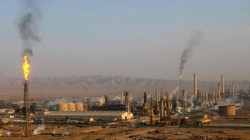Oil Slips as Weak China GDP Data and Libya's Output Resumption Raise Demand Concerns

Shafaq News/ Oil prices experienced a consecutive decline on Monday as concerns about demand intensified, triggered by weak economic data from China and the resumption of oil production in Libya.
According to Reuters data, Brent crude futures fell by 72 cents, equivalent to a 0.9% drop, settling at $79.15 per barrel, while U.S. West Texas Intermediate crude slipped 67 cents, or 0.9%, to reach $74.75 per barrel.
China's National Bureau of Statistics released data indicating that the country's gross domestic product (GDP) growth in the second quarter was a mere 0.8%, a significant slowdown from the previous quarter. This disappointing performance raised concerns about weakening domestic and international demand, further dampening optimism for post-pandemic recovery.
Although Chinese refineries increased their daily crude processing by 1.6% in June compared to May, signaling strong import activity, the market focus remained on the headline GDP numbers.
Experts predict that Beijing will exercise caution in implementing new stimulus measures, as higher commodity prices are a potential consequence. Stefano Grasso, a senior portfolio manager at 8VantEdge in Singapore, observed that China is strategically stockpiling crude at low prices while awaiting a potential recession in the West before fully implementing stimulus measures.
The decline in oil prices followed three weeks of gains and reached the highest levels since April.
The recent shutdown of oilfields in Libya and Shell's suspension of Nigerian crude exports had tightened supply and contributed to the earlier price increase. However, the reopening of two of the three Libyan oilfields over the weekend, namely the Sharara and El Feel fields, with a combined production capacity of 370,000 barrels per day (bpd), partially alleviated supply concerns. The remaining field, 108, remained closed due to protests related to the abduction of a former finance minister.
In addition, Russia plans to decrease oil exports from western ports by approximately 100,000 to 200,000 bpd in the coming month compared to July. This move aligns with Russia's commitment to reducing supply in collaboration with Saudi Arabia, the Organization of the Petroleum Exporting Countries (OPEC) leader.





